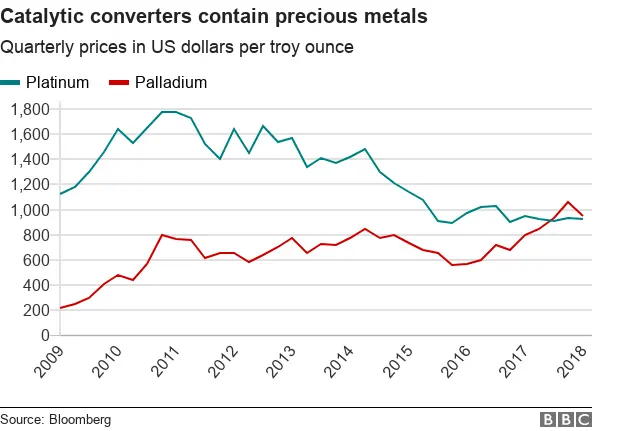Reality Check: Thefts of catalytic converters
 Getty Images
Getty ImagesThere have been many posts on social media in the past few weeks from people shocked at having had the catalytic converters stolen from their cars.
There were videos posted online of masked thieves climbing under cars in broad daylight to saw off the components.
Catalytic converters are part of a car's exhaust system that convert some of the pollutants into less harmful substances.
They are relatively easy to remove from a car, especially those, such as 4x4s, that are further off the ground, and contain precious metals such as platinum and palladium.
The thefts mean large costs for motorists or their insurers because the converter has to be replaced and the damage caused to the vehicle by removing it has to be fixed.

Anecdotally, thefts of catalytic converters tend to rise when platinum and palladium prices are high.
But it is hard to find figures for how widespread the problem is, because the Home Office does not record it as a separate offence.
The Times newspaper submitted Freedom of Information requests to the 43 police forces in England and Wales to ask them how many incidents of catalytic converter theft had been reported.
It received data from 22 of those forces, which said they had had 637 reported incidents in 2017.
But the forces responding did not include the biggest force - the Metropolitan Police.
The Met told BBC Reality Check that the only data it held was for the period since July 2018, when it had recorded 900 reported thefts of catalytic converters.
The theft of catalytic converters is not a new phenomenon - BBC News reported that just over 1,100 had been taken across Britain, not including London, in 2009.
The Scrap Metal Dealer Act 2013 was supposed to make it harder for thieves to sell stolen components, by requiring dealers to be licensed and preventing them paying cash for scrap.
But after an initial peak in 2014, the number of convictions in the category that includes scrap metal dealing has fallen sharply.

Trade association the British Metals Recycling Association has said stretched resources mean the police are unlikely to prosecute scrap dealers operating illegally and are more likely to encourage them to apply for licences retrospectively.
Indeed, it is not unusual to see advertisements for illegal scrap metal dealers offering cash for scrap.
The Met suggests worried car-owners take steps to make their vehicles less vulnerable, such as:
- A serial number could be engraved on the catalytic converter to make it easier to trace and harder to sell at a reputable dealer
- If the converter is bolted on, it may be possible to weld the bolts shut, although that would deter only thieves working with just a spanner
- Protective coverings are available that make the converters harder to steal, although they are "quite expensive"
- High-clearance vehicles (such as 4x4s) could be parked near walls or other vehicles to make it harder to climb underneath them
- Security lighting, CCTV or alarms may also deter thieves



